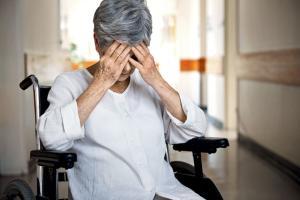One was Hindu one was Muslim Both suffered from the same disease Yet why did one have to suffer more

At around 80, my mother showed the first symptoms when she began falling forward and hurting herself. We attributed it to old age. Representation Pic/Getty Images
 My mother died of a disease I had never heard of until her doctor diagnosed it. It was called Progressive Supranuclear Palsy or PSP. As the name indicates, PSP worsens (progressive) and causes weakness (palsy) by damaging parts of the brain above nerve cell clusters called nuclei (supranuclear).
My mother died of a disease I had never heard of until her doctor diagnosed it. It was called Progressive Supranuclear Palsy or PSP. As the name indicates, PSP worsens (progressive) and causes weakness (palsy) by damaging parts of the brain above nerve cell clusters called nuclei (supranuclear).
At around 80, my mother showed the first symptoms when she began falling forward and hurting herself. We attributed it to the feebleness of old age. Imagine that your brain communicates with your faculties - hearing, sight, speech, mobility and so on - through cables, the way a phone company connects landline phones. Imagine those cables getting frayed because of a progressive disease. Soon the brain can no longer command the organs, and one by one the faculties begin to shut down.
ADVERTISEMENT
Eye movements are usually the first to be affected. My mother had difficulty in shifting her gaze up or down and began moving the entire head to look in different directions. Her eyelids would close involuntarily and re-open with difficulty - but to us that just seemed like the tiredness of old age. She lost control over her facial muscles and her expression froze into a look sometimes hostile, sometimes blank and uninterested.
As my mother’s voice faded and vocabulary diminished, her voice became a barely audible whisper. She could no longer express her wishes; decoding what she wanted required a team.
PSP follows a dreadful and predictable progression of symptoms as each faculty shuts down, all of them tragically dismissible as "signs of old age". Incontinence develops, dignity pads appear. The last of the faculties to go is usually the ability to swallow, which inevitably leads to food entering the pulmonary tract, causing fatal pneumonia.
By then she was about as helpless as a human being can be: immobile, voiceless, sightless, body rigid and covered with bruises from falls, and needing constant vigilance. She had livid bedsores from sitting on a chair all day (though for months we mistook her screams of agony for a persistent bronchial cough).
Most infuriating for her was when well-meaning neighbours would discuss her within earshot, murmuring that "aunty had become retarded". Her body had gone truant and her face was blank but her mind was still completely alert and she understood every word.
My brother installed floor-to-ceiling poles at three-foot intervals so that she had something to hold on to every step of the way to the toilet. Our house looked like an off-duty go-go bar.
We began interviewing nurses - someone had to be near her all the time. We learned that trained nurses were costly and finally hired two ayahs to attend to her in 12-hour shifts. The resident Nepali family of our cook provided additional care when the ayahs went AWOL. By the time she died, from complications of pneumonia, the disease had played with her for nearly six years. Heartbroken but relieved that her suffering had ended, we gave her a Hindu cremation.
What if she had been a Muslim? After her death, suddenly I began hearing more PSP stories than I ever had. I had met the mother of my dear Mumbai friend Altaf Shaikh at her Bandra home: I remember a kind, generous and tender lady. Altaf told me one day that she had been diagnosed with PSP. Unexpectedly, the attending physician’s own mother had also been a victim of PSP. He explained to Altaf the terrible, desolate ending he had to prepare for.
Altaf had no 12-hour ayah. A working family man with a wife and a son, he quit his job and became his mother’s full-time caregiver. For two years, his nights were spent dozing on a beanbag before his mother, in case she stood up at night and tried to head to the toilet alone, but took a fall instead. Altaf was the one who carried her to the toilet, bathed her, fed her.
The worst was watching her searing shame when she helplessly wet herself, no longer able to signal that she needed to pee. PSP robs the elderly of any semblance of dignity.
One day, Altaf realised that he could not be her only support; what if he should fall ill? He did what we’d done, calling agencies that supplied full-time caregivers, whether nurses or ayahs, and enquiring about rates.
He soon realised that there was a similarity to the conversations. At some point, he’d be asked his name and phone number. "Altaf," he’d say. "Altaf Shaikh." There’d be a silence as the Hindu realised that a Muslim was at the other end. Then: "At the moment, all our ayahs are fully booked. May we get back to you later?" He never found a caregiver for his mother. Altaf’s mother died on April 22, 2012, in his arms.
Here, viewed from there. C Y Gopinath, in Bangkok, throws unique light and shadows on Mumbai, the city that raised him. You can reach him at cygopi@gmail.com Send your feedback to mailbag@mid-day.com
Catch up on all the latest Mumbai news, crime news, current affairs, and also a complete guide on Mumbai from food to things to do and events across the city here. Also download the new mid-day Android and iOS apps to get latest updates
 Subscribe today by clicking the link and stay updated with the latest news!" Click here!
Subscribe today by clicking the link and stay updated with the latest news!" Click here!







